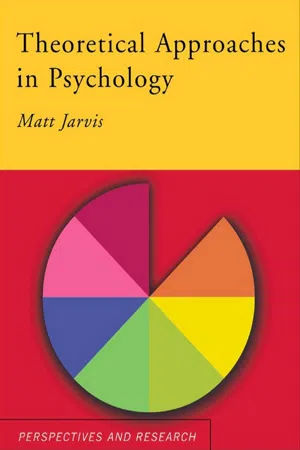Cognitive Development in Adolescence
Cognitive development in adolescence refers to the significant changes in thinking, reasoning, and problem-solving abilities that occur during this stage of life. Adolescents develop more advanced cognitive skills, such as abstract thinking and hypothetical reasoning, which enable them to understand complex concepts and think critically about the world around them. This period is also marked by increased self-awareness and the development of personal identity.
8 Key excerpts on "Cognitive Development in Adolescence"
- eBook - ePub
Developmental and Educational Psychology for Teachers
An applied approach
- Dennis McInerney, David Putwain(Authors)
- 2016(Publication Date)
- Routledge(Publisher)
...CHAPTER 6 Cognitive Development: adolescence to adulthood Introduction As we discussed in Chapter 5, according to Piaget, intellectual development occurs progressively as the growing child moves through a series of stages, that are characterised by qualitatively different cognitive processes, and is confronted with new experiences that must be adapted to the existing mental schemes of the child. Through the processes of assimilation and accommodation, the child either incorporates new experiences into existing schemes or constructs or alters schemes to make them more useful. As the child develops, these intellectual schemes become more sophisticated, so that at the end of the formal stage the child is capable of the full range of logical operations characteristic of adult thought. In this chapter we examine features of formal operational thought which develop in adolescence and some of the challenges that have been levelled at Piagetian theorising and research. We also consider some further implications of Vygotskian theory in cultural context. As well as Piaget and Vygotsky there are a number of contemporary cognitive theories that are particularly relevant to adolescent learners, these include metacognition and metacognitive training, situated learning, and distributed cognition. We will examine each of these in some detail and finish the chapter by considering whether there are differences in the ways males and females think and learn. Piaget and adolescent cognition Formal-operations stage Significant cognitive development continues to occur throughout adolescence. During the period Piaget named formal operational thought there emerges the ability to think abstractly and in a scientific way...
- eBook - ePub
- John Coleman, John Coleman(Authors)
- 2012(Publication Date)
- Routledge(Publisher)
...Research evidence has certainly underlined the wide-ranging implications of physical change in early adolescence but has not, in my view, provided much support for the psychoanalytic notion of psychological upheaval which is supposed to go hand-in-hand with puberty. It is clear that the self concept, particularly that aspect of it associated with physical characteristics, does undergo substantial change which may well result in some temporary instability. None the less this hardly constitutes the sort of vulnerability of personality described in the theoretical literature; and while, on the one hand, it is obviously extremely important for adults to pay attention to the psychological effects of puberty, particularly for late developers, on the other hand, it seems essential not to exaggerate the extent of the effect of these aspects of maturation. COGNITION Those involved in education will no doubt be more aware than others of the significance of cognitive development during adolescence. In a short review such as this it is possible only to draw attention to the major themes, and to highlight one or two of the most significant areas of recent work in this field. For those wishing to read further, good general discussions of cognition in adolescence are to be found in Coleman and Hendry (1990), Serafica (1982) and Conger and Petersen (1984). Changes in intellectual functioning during the teenage years have implications for a wide range of behaviours and attitudes. Such changes render possible the move towards independence of both thought and action; they enable the young person to develop a time perspective which includes the future; they facilitate progress towards maturity in relationships; and finally they underline the individual’s ability to participate in society as worker, voter, responsible group member and so on...
- eBook - ePub
Child and Adolescent Psychology for Social Work and Allied Professions
Applied Perspectives
- Gabriela Misca, Peter Unwin(Authors)
- 2018(Publication Date)
- Bloomsbury Academic(Publisher)
...For example, changes in brain structure affect emotion regulation, response inhibition and planning. Maturation of the brain continues until the mid-20s in most individuals, resulting in advances in abstract reasoning, metacognitive thinking, decision-making, working memory and response inhibition. However, it is important to note that the development of the brain occurs in an irregular, uneven pattern, and as the brain is still developing, adolescent emotional regulation is not yet fully mature. For example, the main changes in the prefrontal cortex during adolescence include: ➢ Increased functional connectivity, referring to the way in which various parts of the brain activate together in the performance of a task. ➢ Synaptic pruning, the process of eliminating extra and weak or poorly developed synapses. ➢ Myelination increases, making speed of processing faster and enabling brain networks to interact more efficiently. In terms of cognitive development, adolescence coincides with Piaget’s period of formal operational thought, with adolescents being increasingly able to think about abstract issues and hypothetical situations. The transition to using abstract thought sees an increase in argumentativeness, self-consciousness, idealism and difficulty in making everyday decisions, and these can be observed as adolescent behaviours. Elkind (1967) suggested that a kind of ‘egocentrism’ appears in adolescence, illustrated by observations that adolescents often imagine how they would appear to an ‘imaginary audience’ and some adolescents become bound up or obsessed with their own feelings, constructing a ‘personal fable’, an imaginary story of their own life. Further reading Elkind, D. (1967) Egocentrism in adolescence. Child Development, 38(4), 1025–1034. doi: 10.2307/1127100. Oda, A. Y. (2007) David Elkind and the crisis of adolescence: review, critique, and applications. Journal of Psychology & Christianity, 26(3), 251–256. Schwartz, P., Maynard, A., & Uzelac, S...
- eBook - ePub
- E. Mavis Hetherington, Richard M. Lerner, Marion Perlmutter, E. Mavis Hetherington, Richard M. Lerner, Marion Perlmutter(Authors)
- 2013(Publication Date)
- Psychology Press(Publisher)
...9 COGNITIVE DEVELOPMENT IN LIFE-SPAN PERSPECTIVE: From Description of Differences to Explanation of Changes Marion Perlmutter University of Michigan ABSTRACT The purposes of this chapter are to articulate an agenda for cognitive developmentalists and to consider how well it is being met. It is suggested that cognitive developmentalists should be addressing two major questions: What are the ways that cognition changes with age? and What are the causes of this change? An overview of alternative approaches to the study of cognitive development is presented, and an integrative, three tier model, framed within a multidisciplinary perspective is forwarded. It is argued that research on cognitive development has made considerable progress with respect to describing the ways that cognition changes with age but has failed in explaining the causes of age change. Some conceptual reasons for the paucity of such information are discussed, and recommendations are made for the reconceptualization of research design, adoption of a life span perspective, and reassessment of assumptions. INTRODUCTION Cognition is a psychological construct that refers to all of mental life. It includes perception, memory, intelligence, reasoning, judgment, and decision making. It permits humans to represent and to think about the world, to conceptualize experience, to fantasize beyond experience, to maintain a sense of self, and to communicate with others. It expands individual competence and allows us to solve and to circumvent problems. Memory, for example, keeps track of events that have occurred in different times and distant places. Intellectual skills enable us to reflect upon experiences and to attach meaning and significance to them. As individuals, this ability gives us the power to anticipate and plan for the future, to develop strategies, to hypothesize alternatives, and to evaluate consequences...
- eBook - ePub
- Peter Mitchell, Fenja Ziegler(Authors)
- 2013(Publication Date)
- Psychology Press(Publisher)
...Chapter 3 DOI: 10.4324/9780203736357-3 Contents Introduction Stages of cognitive development Piaget’s explanation of cognitive development Traditional learning theory as a contrasting explanation of development A supplement to Piaget’s theory: Self-centered adolescents Summary The development of thinking 3 Chapter Aims To introduce Piaget’s theory of cognitive development. To detail Piaget’s stages. To detail the evidence that lends support to Piaget’s stage theory. To present the mechanism that Piaget posited as responsible for cognitive development. Introduction The discipline concerned with studying the development of thinking is cognitive developmental psychology. The word “cognitive” refers to knowledge, but not necessarily according to the common meaning of the word. When people talk about knowledge, they usually mean the kind of information useful for answering questions in games such as The Weakest Link or Who Wants to be a Millionaire, or in order to do college exams. In contrast, cognitive developmentalists think of knowledge as referring to understanding about things. You might have noticed a child aged around 5 years speaking on the telephone about things only he can see: He seems to overlook the fact that the person he is speaking to is in a completely different location and cannot see the same things. Perhaps this is a sign that the young child is incapable of putting himself in someone else’s shoes. In the broadest sense, it is tempting to suppose that the child does not understand that other people can have different perspectives. Cognitive developmentalists look at particular difficulties children have, such as poor communication ability, and then draw general conclusions about their underdeveloped knowledge of the world...
- eBook - ePub
- Margaret Harris, Gert Westermann(Authors)
- 2014(Publication Date)
- Psychology Press(Publisher)
...Chapter 16 Cognitive Development in Adolescence DOI: 10.4324/9781315867212-16 Contents 16.1 Piaget's Theory Of Formal Operational Reasoning 16.2 Criticisms Of Piaget's Theory 16.3 The Development Of Executive Functioning 16.4 Summary After reading this chapter you will be able to describe Piaget’s account of formal operational reasoning and some of the key tasks that Piaget and Inhelder devised to assess adolescent reasoning evaluate Piaget’s account in the light of more recent research into moral reasoning and understanding of conditional probability describe the development of executive functioning in adolescence and relate this to brain development. In this chapter we consider the main cognitive changes that occur as children move towards adulthood. From the contemporary perspective of Western society in the early twenty-first century it is hard to believe that the psychological study of Cognitive Development in Adolescence is a relatively recent phenomenon. In a Manual of Child Psychology, published in 1954, Horrocks devoted barely one page to the mental growth of adolescents. However, in 1955, Inhelder and Piaget published The Growth of Logical Thinking from Childhood to Adolescence, which was translated into English almost immediately (Inhelder & Piaget, 1958 ; Moshman, 1998). This book fundamentally changed the way that psychologists and educationalists viewed Cognitive Development in Adolescence and firmly established the view that adoles cence was a structurally distinct period of cognitive development in which thinking advanced well beyond the achievements of middle childhood. 16.1 Piaget's Theory Of Formal Operational Reasoning Although it was the writing of Piaget and Inhelder that revolutionised views of adolescent cognition, the idea that cognition progresses beyond childhood was first advanced by James Mark Baldwin, writing at the end of the nineteenth century. Baldwin argued that there was a ‘hyper-logical’ stage of mental development...
- eBook - ePub
Teacher and Pupil
Some Socio-Psychological Aspects
- Philip Gammage(Author)
- 2017(Publication Date)
- Routledge(Publisher)
...The self-reflections in part necessary for this establishment are closely connected to the norms and mores of the prevailing culture or sub-culture. Thus from generation to generation different emphases, life styles and fashions bring accompanying changes which show themselves as ‘problems’ at nodal development points in the growth process. Adults may in all probability best understand the turbulent situations of adolescence by appreciating the adolescent as a person rather than placing excessive emphasis upon the context of the situation; and as a person he will need acceptance, the opportunity to give and receive affection, status in the peer group, possibilities for real exploration and adventure (including sexual exploration) and the chance to make sense of the world around him. Those concepts of social ideals and social justice which have been emerging during latency at the interpersonal level gain a far greater significance with the gradual growth of formal reasoning at the age of twelve or so. Piaget and Inhelder (1969) say, ‘The possibilities opened up by these new values are obvious in the adolescent, who differs from the child in that he is not only capable of forming theories but is also concerned with choosing a career that will permit him to satisfy his need for social reform and for new ideas.’ The process of acquiring a sense of personal identity which is the major task of adolescence and which is acquired largely through social interaction is a concomitant of expanding and changing values. Indeed, the adolescent may frequently discover that adults are capable of misrepresentation and that ‘parents do not always “tell it like it is”’ (Medinnus and Johnson, 1968). Intellectual development has gradually bestowed the completion of reflective thought and the adolescent’s reflections and probings may not always be for the comfort of his elders...
- eBook - ePub
- Matt Jarvis(Author)
- 2005(Publication Date)
- Routledge(Publisher)
...Modern teaching techniques ranging from individual discovery learning to computer-aided work in pairs has been influenced by the work of Piaget and Vygotsky. There are other situations in which it is helpful to have a good understanding of the way in which children think. These range from play-work, in which it is helpful to understand children’s concepts of rules, to anaesthesiology (the study of pain and pain relief), where it is invaluable to have a grasp of children’s understanding of the pain they are experiencing as a result of medical conditions and medical procedures. Despite these invaluable contributions, a cognitive-developmental approach is not generally considered to be sufficient for a complete understanding of psychology, or even of child psychology. Some of its limitations include the following: From a psychodynamic perspective, the cognitivedevelopmental approach neglects the importance of children’s emotional development. In a sense this is not a fair criticism of Piaget, who admired the work of Freud (see Chapter 3) and saw his own work as complementing rather than rivalling Freud’s theories. However, it is fair to say that the cognitivedevelopmental approach does not really tackle emotional development, which is clearly of huge importance to children’s psychological development. From a behavioural perspective (see Chapter 2), the cognitivedevelopmental approach overemphasises speculation about mental processes at the expense of more scientific research into the importance of conditioning in learning. Summary Cognitive-developmental psychology is an approach to understanding the development of logical thought, and the ways in which this impacts on our behaviour. The most influential theory in this area comes from Piaget, whose major contribution was in identifying the ways in which childhood logic differs from that of adults. Piaget also emphasised the process by which children explore and learn from their environment...







